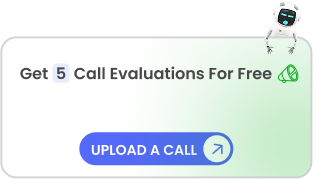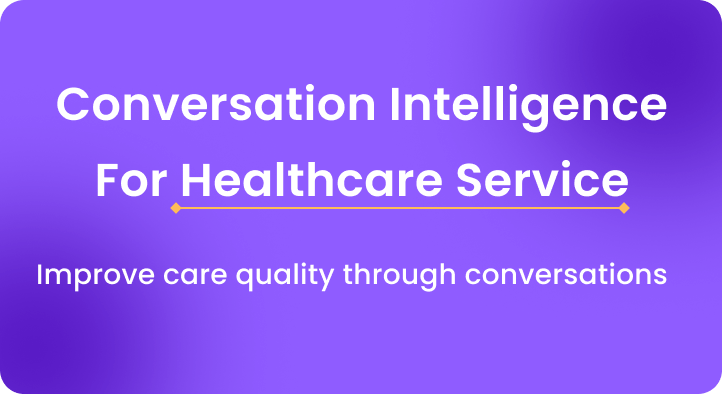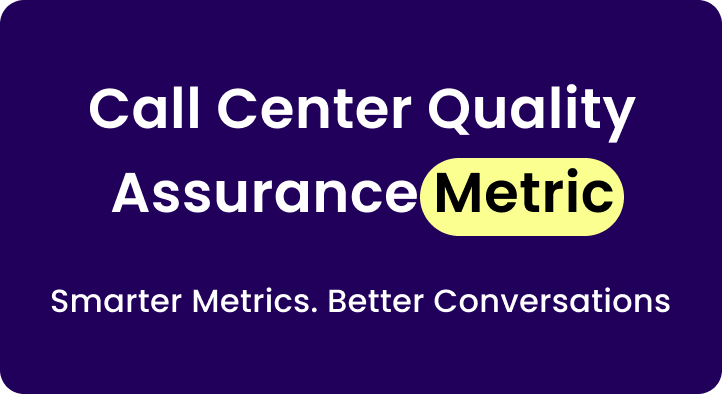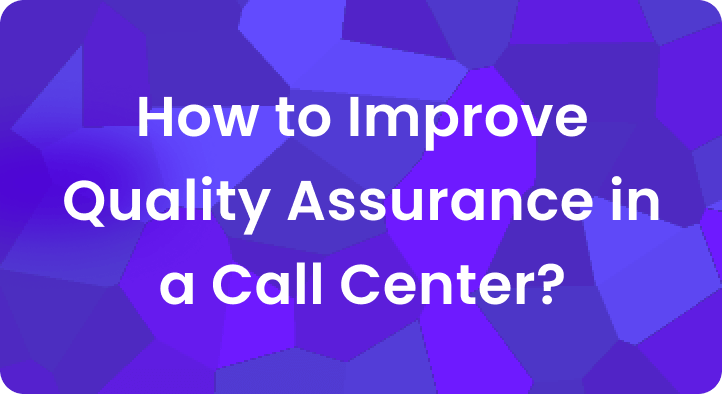What if you could review every customer call, without adding a single QA analyst?
No missed insights, no coaching delays, no compliance risks. That’s the promise of AI-driven call quality assurance.
AI QA tools automatically analyze 100% of calls using speech analytics, sentiment detection, and machine learning.
They score interactions, flag issues, and surface coaching moments, giving you actionable insights at scale.
Traditional QA can’t keep up. Reviewing 1–2% of calls manually just isn’t enough anymore.
In this guide, we’ve reviewed the top 9 AI-driven call Quality Assurance platforms based on features, use cases, and scalability.
Whether you’re focused on coaching, compliance, or performance, this list will help you choose the right tool for your contact center.
Best call center quality assurance software for small businesses
- Enthu.AI
- Observe.AI
- CallMiner
- Scorebuddy
- Balto
Upload Call & Get Insights
 DOWNLOAD DUMMY FILE
DOWNLOAD DUMMY FILE A. Top 9 AI-driven call quality assurance platforms in 2025
Here’s the list of the top 9 call center quality assurance software.
1. Enthu.AI
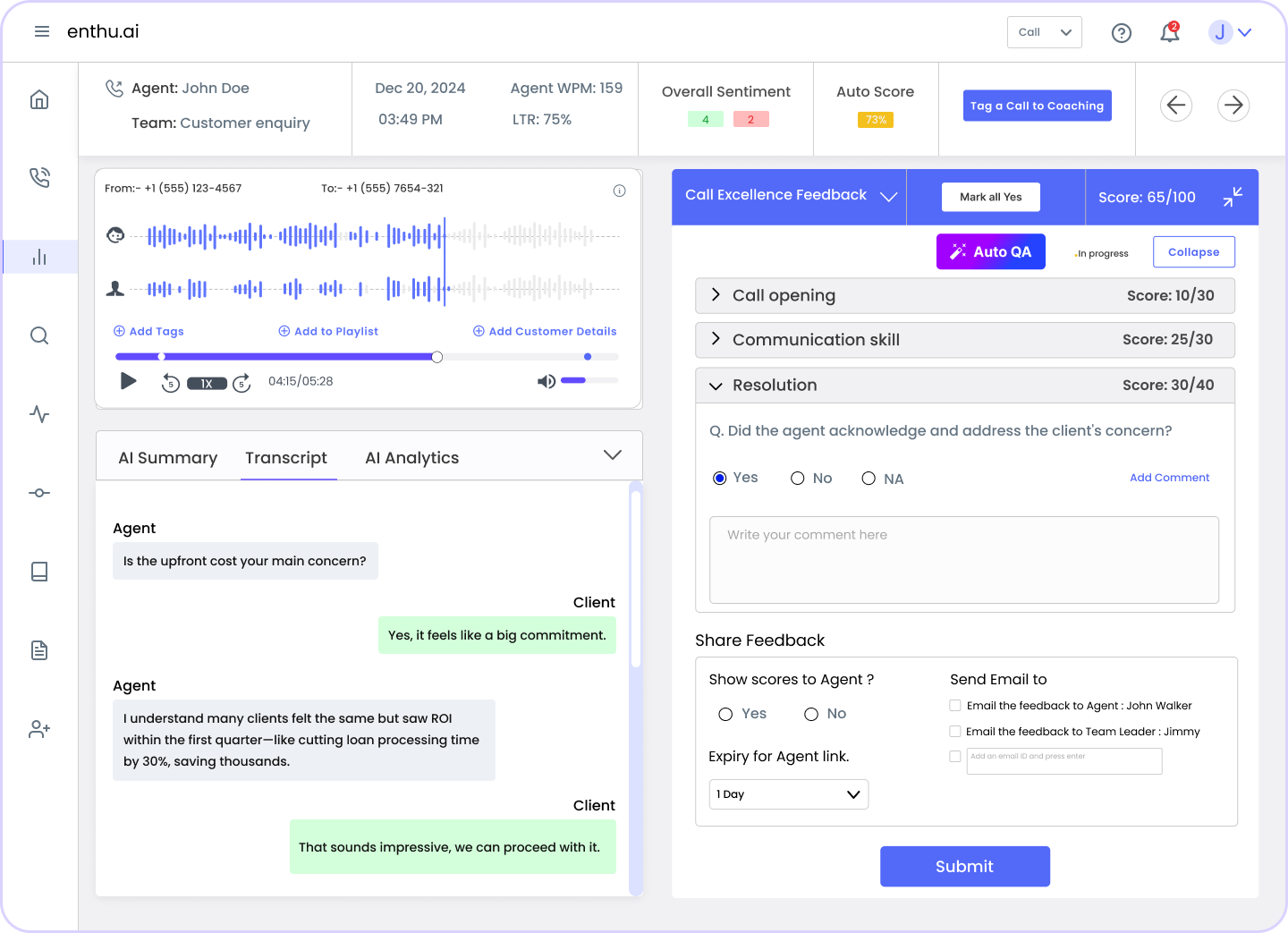
Enthu.AI is a lightweight yet powerful Auto QA platform built for fast-moving QA teams that want actionable call insights without complex setup or enterprise overhead.
Best for:
Small to mid-sized contact centers looking for a fast, no-fuss Auto QA solution with a strong focus on coaching and call insights.
Core Features:
- Auto QA with customizable scorecards
- Phrase tracking and compliance flagging
- Sentiment Analysis
- Coaching workflows and agent performance trends
- Manual and AI-assisted evaluations
AI Capabilities:
Enthu.AI uses AI to transcribe, analyze, and score customer calls. It flags critical behaviors, identifies knowledge gaps, and offers coaching-ready insights. Phrase intelligence and scoring logic are powered by NLP and behavior tagging models.
Strengths / Limitations:
- Easy to set up with no heavy integrations
- Intuitive UI built for QA and CX teams
- Lacks real-time agent assist or multi-language support (as of now)
Website: Enthu.AI

The interface looks nice. Integrations are ready quickly. Have low costs, great monthly subscription. Best call transcription with analysis! Responsive team. Highly recommend!
Alex McConville
Head of Central Sales

Enthu. AI is an amazing and flexible conversational intelligence with strong integration capabilities. Provides high level of accuracy on call transcript and has strong word recognition.
Scott Bierbryer
Chief Revenue Officer
2. Observe.AI

Observe.AI is a robust, enterprise-grade platform offering end-to-end AI QA, real-time agent assist, and deep coaching tools, ideal for large contact centers with complex compliance needs.
Best for:
Large contact centers with complex QA needs, compliance requirements, and an interest in real-time agent assistance.
Core Features:
- Auto QA with AI scoring
- Real-time agent coaching and assist
- Workflow automation for evaluators and supervisors
- Coaching plans and performance tracking dashboards
AI Capabilities:
Observe.AI uses deep speech analytics, NLP, and ML to evaluate 100% of calls and surface issues in real time. Its real-time agent assist guides reps during live conversations, improving outcomes as they happen.
Strengths / Limitations:
- Highly scalable with robust analytics
- Strong compliance support and real-time tools
- Premium pricing and longer implementation cycles
Website: Observe.ai
3. CallMiner Eureka

CallMiner Eureka is a data-heavy platform known for its deep speech analytics, emotion detection, and strong VoC capabilities, tailored for enterprises with strict regulatory and compliance requirements.
Best for:
Enterprise teams focused on compliance, risk mitigation, and Voice of Customer (VoC) analysis at scale.
Core Features:
- Deep speech and text analytics
- Sentiment and emotion tracking
- Auto QA scoring and custom scorecards
- VoC, customer effort, and agent behavior insights
AI Capabilities:
Eureka uses advanced NLP and emotion detection to go beyond simple transcription. It identifies not just what was said, but how it was said-detecting emotion, stress, silence, and effort.
Strengths / Limitations:
- Comprehensive analytics with customizable dashboards
- Ideal for regulated industries and complex QA workflows
- Complex UI, steep learning curve for non-analyst users
Website: Callminer.com
4. Balto
Balto is a real-time conversation guidance tool that listens to live calls and coaches agents in the moment, making it a favorite for outbound sales and compliance-driven teams.
Best for:
Sales and support teams that need real-time agent guidance and live call quality control.
Core Features:
- Real-time agent assist during calls
- Smart checklists and dynamic prompts
- QA scoring with live coaching alerts
- Post-call insights and reporting
AI Capabilities:
Balto leverages real-time speech recognition and NLP to analyze calls as they happen. It guides agents with on-screen prompts and flags script deviations, objections, or missed opportunities in real time.
Strengths / Limitations:
- Best-in-class real-time assist engine
- Improves live call handling and objection management
- Not designed for deep post-call analysis or reporting
Website: Balto.ai
5. Tethr

Tethr turns customer calls into CX insights by using AI to measure effort, emotion, and root causes – perfect for companies focused on reducing friction and improving satisfaction.
Best for:
CX and QA teams focused on reducing customer effort and improving satisfaction scores through post-call insights.
Core Features:
- Customer effort scoring
- Call driver analysis and categorization
- Compliance and QA automation
- VoC and agent behavior dashboards
- Integration with CRM and BI tools
AI Capabilities:
Tethr uses AI to map conversation patterns to customer friction points.
It analyzes tone, language complexity, escalation signals, and resolution drivers to measure and improve customer effort and experience.
Strengths / Limitations:
- Highly actionable CX insights
- Strong alignment with VoC strategies
- Less focus on real-time capabilities
Website: Tethr
6. Gong

Gong is a revenue intelligence platform that analyzes sales conversations to uncover deal risks, coaching opportunities, and pipeline insights, popular among B2B sales teams.
Best for:
B2B sales teams and revenue operations are looking to turn conversations into pipeline insights.
Core Features:
- Call transcription
- Conversation trends and rep performance analysis
- CRM sync and forecasting
- Coaching tools and keyword tracking
AI Capabilities:
Gong’s AI analyzes sales calls and meetings to identify deal risks, talk-time balance, competitor mentions, and buying signals. It focuses more on revenue intelligence than traditional QA.
Strengths / Limitations:
- Excellent for sales conversation analysis
- Strong forecasting and coaching tools
- Not tailored for support or compliance QA workflows
Website: https://www.gong.io
7. Chorus.ai (ZoomInfo)

Chorus.ai helps sales and success teams unlock conversation data to improve win rates, track messaging, and identify buyer trends across the customer journey.
Best for:
Sales and customer success teams are looking for conversation intelligence tied to buyer journeys.
Core Features:
- AI Transcription and keyword analysis
- Talk ratio and engagement scoring
- Deal tracking and collaboration tools
- Coaching workflows for sales leaders
- CRM integration and call tagging
AI Capabilities:
Chorus uses NLP and pattern recognition to analyze sales conversations for engagement signals, competitor mentions, and coaching moments. It maps conversations to pipeline health.
Strengths / Limitations:
- Ideal for go-to-market and RevOps teams
- Great UI and playback experience
- Not purpose-built for QA in customer support centers
Website: Zoominfo/Chorus
8 Avoma

Avoma is an AI meeting assistant that auto-generates call summaries and insights, making it ideal for teams juggling sales, success, and support conversations across the funnel.
Best for:
Hybrid teams doing a mix of customer support, sales, and success calls, looking for AI notes and meeting intelligence.
Core Features:
- AI-generated call summaries and notes
- Transcription and speaker separation
- Meeting agenda and follow-up automation
- Collaboration tools for coaching
- CRM sync and integrations
AI Capabilities:
Avoma uses AI to generate structured summaries, surface key action items, and categorize calls. It’s ideal for teams who want searchable, shareable insights from meetings and calls.
Strengths / Limitations:
- Strong meeting insights with AI note-taking
- Versatile across sales, CS, and support
- Limited QA-specific features compared to dedicated tools
Website: Avoma
9. Scorebuddy AI

Scorebuddy combines traditional QA scorecards with new AI capabilities, offering a flexible and scalable solution for teams that need customizable evaluations with automation built in.
Best for:
QA teams that want a flexible scorecard design with built-in AI scoring and analytics.
Core Features:
- Custom QA scorecards
- Auto QA with rule-based and AI logic
- Reporting and trend analysis
- Calibration tools
- Integrations with CCaaS and CRM platforms
AI Capabilities:
Scorebuddy recently added AI to automate call scoring and reduce subjectivity. It blends rule-based scoring with machine learning for faster QA at scale.
Strengths / Limitations:
- Strong for formal QA processes and compliance
- Flexible scoring and calibration tools
- AI insights are less advanced than newer competitors
Website: Scorebuddy
B. A comparison table: features, use cases & pricing
Here’s a quick overview of each platform
| Platform | Best For | Key AI Features | Core Use Cases | Pricing Tier* |
| Enthu.AI | SMB QA teams | Auto QA, phrase tracking, coaching insights | Scalable QA, coaching, calibration | $$ (mid-range) |
| Observe.AI | Large enterprises & BPOs | Real-time assist, AI scoring, sentiment | Compliance, coaching, real-time QA | $$$ (premium) |
| CallMiner | Regulated industries, analytics-heavy teams | Emotion/silence detection, Auto QA | Compliance, VoC, risk analysis | $$$ (premium) |
| Balto | Sales/support needing live coaching | Real-time prompts, scripting guidance | Live agent assist, sales enablement | $$$ (premium) |
| Tethr | CX teams focused on VoC/effort | Customer effort scoring, NLP-based insights | CX improvement, escalation analysis | $$$ (premium) |
| Gong | B2B sales & RevOps teams | Deal risk detection, rep scoring | Sales coaching, revenue forecasting | $$$ (premium) |
| Chorus.ai | Sales & success teams | Conversation analysis, CRM sync | Buyer journey insights | $$$ (premium) |
| Avoma | Hybrid teams (sales, CS, support) | AI notes, auto-summaries | Meeting intelligence, post-call notes | $$ (mid-range) |
| Scorebuddy AI | QA-focused teams need flexibility | AI + rule-based scoring, scorecard customization | Formal QA, calibration | $$ (mid-range) |
C. How to choose the right call QA platform?
With so many platforms offering AI-driven call quality assurance, choosing the right one can feel overwhelming.
But the best-fit tool isn’t the one with the most features; it’s the one that aligns with your team’s size, goals, and day-to-day challenges.
1. Key Factors to Consider
Before choosing a platform, ask yourself the following:
- Call Volume: Teams with high call volumes need a platform that can analyze thousands or even millions of conversations without performance issues. Look for scalable infrastructure and smart filtering options to manage data efficiently.
- QA Goals: Whether the focus is on coaching, compliance, or customer experience, each platform brings different strengths. Some excel at real-time agent assist, while others are optimized for post-call analytics and coaching workflows.
- Ease of Use: Daily adoption depends on intuitive design. A clean interface, simple workflows, and minimal learning curve make it easier for QA analysts, team leads, and managers to get value from the platform.
- Custom Scorecards & Rules: Flexible QA scorecards are critical for teams with diverse workflows. Some tools offer pre-built templates, while others allow deep customization, including rule logic, weights, and calibration tools.
- Integration Needs: Seamless integration with your existing dialer, CRM, or CCaaS stack (e.g., Genesys, Zendesk, Salesforce) ensures a smoother QA process and more centralized reporting.
- Budget & ROI: Not every team needs an enterprise solution. Mid-market platforms often provide faster ROI by balancing automation, accuracy, and ease of use without the overhead of custom deployment.
2. SMB vs. Enterprise Needs
1. SMBs & mid-market teams
Focus on speed, simplicity, and value. You likely need:
- Quick setup
- Easy-to-use dashboards
- Auto QA to cover 100% of calls
- Coaching-friendly features
Tools like Enthu.AI, Avoma, or Scorebuddy AI are great fits.
2. Enterprise Teams
Require scalability, security, and advanced analytics. You’ll need:
- Multi-team workflows
- Custom scorecards
- Compliance automation
- Integration with enterprise tech stacks
Look at Observe.AI, CallMiner, or Tethr for deeper capabilities.
3. Sales vs. support vs. compliance use cases
- Sales Teams: Prioritize deal insights, rep behavior, talk ratios, and coaching opportunities. Go with Gong, Chorus.ai, or Avoma.
- Support Teams: Need to monitor empathy, resolution time, and adherence to scripts. Choose tools like Enthu.AI, Scorebuddy AI, or Tethr.
- Compliance Teams: Require 100% call review, script adherence, and issue flagging. Consider CallMiner, Observe.AI, or Balto for compliance-heavy environments.
FAQs
1. What is AI quality assurance for call centers?
Call Center AI Quality Assurance uses artificial intelligence to automatically analyze, score, and review all customer conversations, leading to improved agent performance and ensuring compliance while saving time on manual reviews.
2. What are the AI tools in call centres?
Auto QA platforms, real-time agent assist, sentiment analysis, speech analytics, and AI chatbots are some tools available in call centers. Enthu.AI is one such tool that helps automate call reviews, improve coaching, maximize compliance and improve the Customer Experience at scale.
3. How can AI be used in QA?
Call center QAs may apply AI to automatically assess how well customers were served. It notes what was said, rates how well the agents did, highlights problems such as breaking rules or not showing enough understanding, and finds chances for teaching – saving time, cutting out unfairness, and allowing for complete call monitoring.
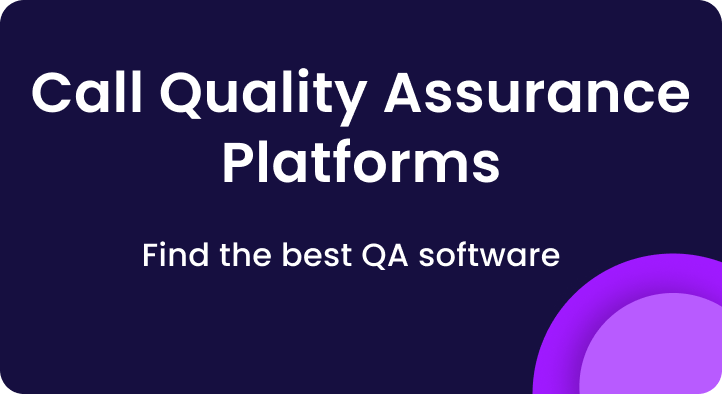




 On this page
On this page